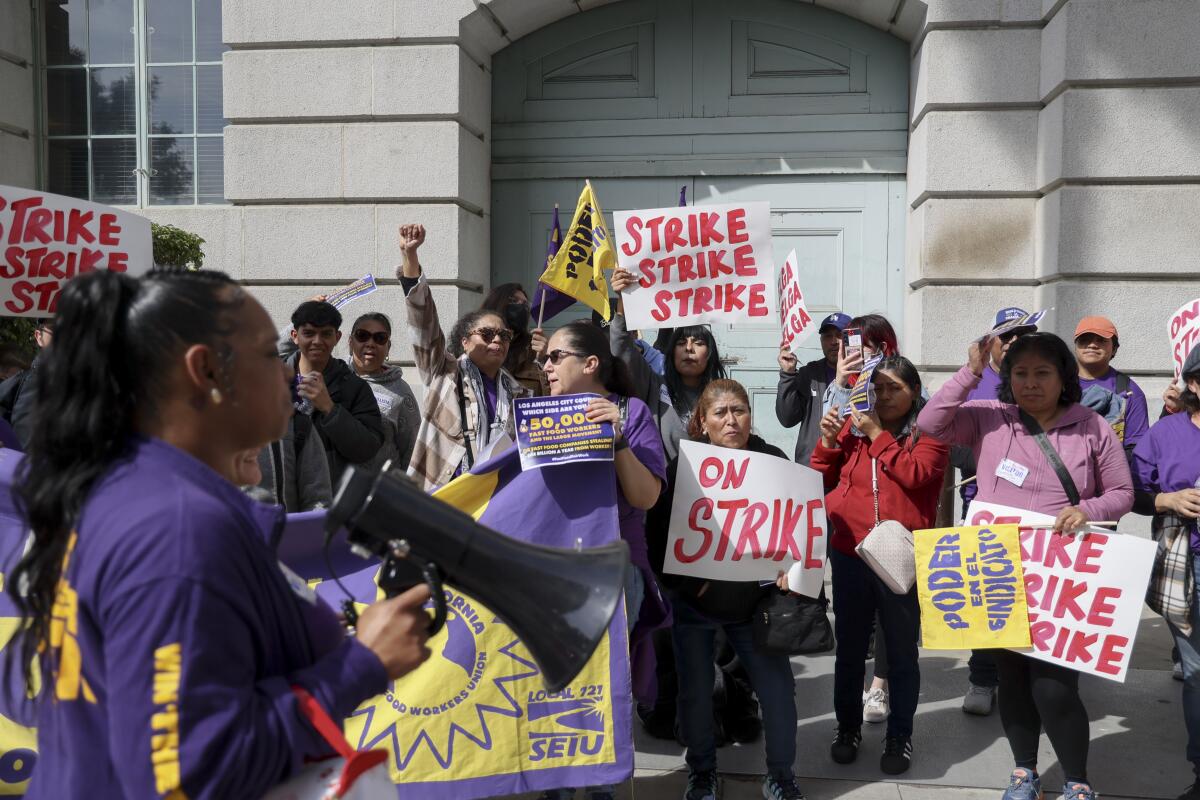L.A. fast-food workers call on city officials to approve Fair Work Week law

- Share via
A group of Los Angeles fast-food workers walked off the job Tuesday to urge city officials to approve a law that would give them more control over their work schedules.
Fast-food workers have long complained of unstable schedules that make it difficult to plan their finances, child care, medical appointments and other obligations.
Los Angeles City Councilmember Hugo Soto-Martinez introduced an ordinance last year that aims to give these workers more stability and consistency in scheduling, but the council has yet to vote on the measure.
The proposal would expand the reach of the city’s existing Fair Work Week law — which requires that employers give retail workers their schedules in advance — to include some 2,500 large chain fast-food restaurants that employ roughly 50,000 workers.
More than 60 fast-food workers rallied outside City Hall around 11 a.m. Tuesday sporting purple union T-shirts and carrying “on strike” signs printed in Spanish and English.
The rally was planned by a statewide union of fast-food workers, which was established last year. The California Fast Food Workers Union is affiliated with the Service Employees International Union, which for years has helped to organize fast-food employee walkouts over wage theft, safety and pay.
Lizzet Aguilar, 44, a cashier at a McDonald’s in the downtown L.A. area, said she was scheduled for a three-hour shift Tuesday that she skipped to join the rally.
Aguilar said she was scheduled to work only two days this week, with each shift just three hours long.
Having so few hours, she said, makes it difficult to contribute to her household finances and care for her 10-year-old son, whom she brought with her to the rally.
“This isn’t fair. We can’t survive on this,” she said.
Several workers from a Wingstop in Westwood also participated in the rally.
Edgar Recinos, 32, a Wingstop cook who earns $20 an hour, said he struggles to pay his rent when his schedule and hours change weekly.
Recinos said he was scheduled last week for 30 hours, but this week he’s scheduled for 17 hours. He added that he works a second job at a smoothie store.
“It makes no sense,” Recinos said. “It’s an unstable situation.”
The tentative ordinance also includes an annual mandatory six-hour paid training to help educate workers on their rights. And it would require that fast-food workers accrue an hour of paid time off for every 30 hours they work — on top of paid sick leave to which they are already entitled.
The Fast Food Workers Union cited a recent report published by labor researchers at Northwestern and Rutgers that found 1 in 4 fast-food workers were illegally paid below the minimum wage. Additionally, these workers lose almost $3,500 a year, or about 16% of their income, because of this persistent wage theft in the industry, the report said.
Business and trade groups oppose the ordinance and have said that it would complicate staff scheduling. Rob Kirksey, who owns local Wingstop franchise locations, said expanding the Fair Work Week ordinance could hurt small businesses, who are already struggling with added costs of a $20 minimum wage for fast-food workers implemented last year.
“Since April, I’ve had to raise my prices and cut worker hours to make ends meet,” said Kirksey. “If additional cost mandates are piled on to my local restaurants, I’m not sure I’ll be able to stay in business. I hope council members realize that they’re putting minority-owned small businesses like mine at risk if they pass this ordinance.”
Legislation related to boosting worker protections typically doesn’t face substantial barriers in the L.A. City Council. However, the process can take time and the matter must first be heard by the council’s economic development and jobs committee before going to the full council for a vote.
A measure to boost wages for hotel and airport workers, for example, was introduced by council members in April 2023 and was finally approved more than a year and a half later, in December 2024.
More to Read
Inside the business of entertainment
The Wide Shot brings you news, analysis and insights on everything from streaming wars to production — and what it all means for the future.
You may occasionally receive promotional content from the Los Angeles Times.











